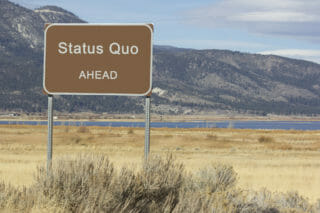
Back on January 4, 2018, the industry was in a slight tailspin due to then acting Attorney General Jeff Session’s (renowned marijuana hater) rescinding of all marijuana enforcement guidance from the Department of Justice (“DOJ”). Reactions in the media ranged from treating the Sessions announcement as nothing more than an attempt to frighten the cannabis industry to claiming that it was the first step in an organized crackdown of the marijuana industry that could affect cannabis businesses and users. Both possibilities are arguably realistic. And the drama that followed Sessions’ moves was pretty satisfying, including when Cory Gardner vowed to (and did) block DOJ appointments until the issue was resolved in favor of the states, culminating in a deal with President Trump to back off of state-legal marijuana. However, now that Sessions is out at the helm of the DOJ, industry folks can breathe a little easier where new Attorney General nominee William Barr has gone on record stating that state-law abiding cannabis businesses will not be prosecuted by the DOJ and essentially that the 2013 Cole Memo will be back from the dead.
In rescinding all DOJ guidance on marijuana enforcement, Sessions torpedoed the famous 2013 Cole Memo, which outlined eight specific enforcement priorities of the DOJ in states with legal marijuana and which, between the lines, indicated that “robust” state regulations would keep the DOJ at bay regarding enforcement of the federal Controlled Substances Act. After that memo, entire states built their comprehensive cannabis licensing and taxation systems on those eight enforcement priorities, ensuring that compliance restrictions and barriers to entry were strong enough to support the same. Instead, Sessions put in place the “Sessions Memo,” which was short on specifics. It doesn’t contain an outright directive ordering U.S. Attorneys to go after marijuana businesses. It simply withdraws all of the earlier marijuana-specific guidance memoranda and directed U.S. attorneys to treat marijuana sales like any other federal crime. The withdrawn memos include, the 2013 Cole Memo, the February 2014 Cole Memo that extended low enforcement priority status to apply to banking activities (although the FinCEN guidelines are, importantly, still alive); and the 2014 Wilkinson Memo that was a sort of Cole Memo for tribal lands.
Right now, U.S. attorneys have full discretion to determine to what extent they can/should enforce federal law in the context of marijuana crimes in states with legalization and medicalization–which they always had anyway–but the 2013 Cole Memo helped them prioritize certain marijuana issues across the DOJ. In his memo, Sessions referred to the principles of enforcement in the U.S. Attorneys’ Manual, but that document reinforces the level of discretion and authority that each U.S. attorney has already. The Cole Memo was ultimately useful in providing a consistent nationwide federal policy. Under Sessions Memo, we are back to the days of having potentially 93 different enforcement policies — one for each U.S. Attorney. To date, there haven’t been any reported incidents of the Feds going after state-law compliant cannabis operators in states that have legalized and regulated.
A new sheriff is coming to town though, and that could be a very good thing for the momentum of state-by-state legalization in that states will better know what to expect from Big Brother as will marijuana businesses and their investors. William Barr may end up becoming a very unlikely helper when it comes to state-legal cannabis. He was Bush I’s attorney general from 1991-1993, and he’s a dyed in the wool conservative who, as Attorney General, was “tough on crime” and put many, many people in prison. As reported by Marijuana Moment, Barr in a mid-January hearing with Congress testified that:
My approach to this would be not to upset settled expectations and the reliant interests that have arisen as a result of the Cole memorandum . . . However, I think the current situation is untenable and really has to be addressed. It’s almost like a backdoor nullification of federal law . . .
While Barr also testified that he wouldn’t go “after companies that have relied on [2013] Cole memorandum . . . ,” he also didn’t completely kowtow to state legal cannabis. He further testified that “we either should have a federal law that prohibits marijuana everywhere, which I would support myself because I think it’s a mistake to back off marijuana. However, if we want a federal approach—if we want states to have their own laws—then let’s get there and get there in the right way.”
In reading the tea leaves, it sounds like, personally, Barr would have no issue with continuing the War on Drugs as it relates to cannabis. As a department under his watch and command, however, the DOJ probably wouldn’t spend time and valuable resources on state-legal operators — even if Barr is concerned that the current dynamic is breeding “disrespect for the federal law.” Reasonable minds can differ, but I’d say that most cannabis operators and states are very mindful of federal law enforcement and it’s really Congress, the DOJ, and the President to blame for creating legal confusion because of varied enforcement over the years.
In the end, Barr’s testimony ultimately serves to show the country that Congress has been woefully impotent and ignorant when it comes to cannabis as a whole and especially as the topic relates to states’ rights. What’s good to know though is that if Barr is confirmed, we’re very likely returning to the 2013 Cole Memo principles, which will at least create a political atmosphere of certainty in that the DOJ has bigger fish to fry than state-legal marijuana. Right now, Barr is pretty much a lock for U.S. Attorney General, so hopefully he’ll make good on his cannabis compromises.























